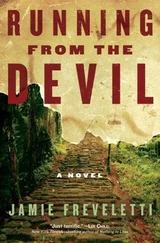The next day Bianca and Susan found my mother sweating in her bed, reeling from nausea. Since arriving in Africa she had been given to bouts of malaria. Bianca took away the thick blanket my mother had wrapped herself in and directed the electric fan onto her. My mother was shivering uncontrollably and she felt chilled to the bone, but her temperature was spiralling upwards of one hundred degrees.
Outside the city was silent. No activity could be seen beyond the windows of State House; no more announcements were broadcast on the radio. We spent the whole day indoors. Donald and Susan went home and came by later in the afternoon. There was no more news: no newspapers; even the telephone lines were out.
In the evening the music on the radio stopped abruptly and the radio fizzed and sputtered for a moment. Finally a crackling voice became audible. Bianca crossed the room and turned the volume up. It was David Lansana. His voice, ponderous and heavy, filled the air. He declared the appointment of Siaka Stevens unconstitutional.
‘In order to prevent further acts of violence…civil war in our country, I have carried out my duty as first commander of the army of Sierra Leone and taken charge of the situation. The army is in control and you have my promise that I will do all in my power to see that justice is done.’ Here the broadcast ended. He had added nothing more than everyone already knew.
In the early hours of the following morning David Lansana was arrested by four of his own men.
A few hours later, when it was light, we heard the familiar growl of the Mercedes. The two APC men were back as they had promised. There was no news of my father who, as far as anyone knew, was still being held in State House. But the two men had an idea.
‘Dr Forna was once in the army, yes?’ one of them asked.
‘Yes.’ By now my mother was more or less recovered from her malarial fever.
‘Where do you keep his uniform?’
‘It’s up in Koidu at the house. But he hasn’t worn it for ages, at least two years. He left the army. Why?’
‘We must go and bring it down. Can you come with us?’
Our mother caught their drift. The men who had arrested Lansana were majors. As one of the medical personnel my father had been a major in the army, too. He was their equal plus; he outranked the men who were holding him at State House. Challenging Lansana had brought him enormous popularity among the ranks, which was still well remembered. Perhaps, in his uniform, he would be able to command loyalty from enough of them to secure his release and that of his colleagues.
It was a long shot and more than a little dangerous. Our mother would have to travel up to Koidu and back, and then, God only knew how, smuggle the uniform to him in State House. But to my mother, in the light of her current predicament, any plan seemed like a good one.
They left immediately. Susan accompanied her, lending moral support, and they bluffed their way through the road blocks by pretending to be missionaries on their way up-country. Outside Freetown the checkpoints ended and they drove at speed, stopping only once to buy drinks at the roadside. At the house they slept briefly and set out again while the sky was still flushed with pink; under the front seat of the car, folded and ironed, was the uniform. The atmosphere in the car on that journey along the roads and in villages could not have been more different, said our mother, from our triumphant passage to Freetown, just two days before.
The next time my mother saw my father’s uniform he was wearing it – or assorted parts of it, at any rate. We were back at home in Koidu; back into our old life – as far as that was possible. In our father’s absence family life became one-dimensional: we had routine without substance, days with form but no purpose, like a water pot with a broken base. One afternoon he strolled back through the front door wearing khaki shorts beneath a plain cotton shirt and long, military socks incongruously worn with his sandals. His beard had grown back and he was looking altogether leaner. He went straight into the bathroom, shaved his face clean, changed his clothes and opened the surgery.
Early in the evening of the third day of their incarceration soldiers had arrived at State House; they had seized Siaka Stevens and taken him to Pademba Road Prison. There, he was joined shortly afterwards by Albert Margai and Brigadier Lansana. My father and the Taqi brothers remained imprisoned along with the governor-general at State House for two more days before they were all released without ceremony. He had searched us out at Bianca and Ade’s house; once he was reassured we were fine, he departed with his colleagues. Who knows whether he had the chance to put the uniform to the test? I never found out. My father barely spoke of his experiences and my mother did not ask.
Back together my parents concentrated on the functions of living: the clinic, the patients, their children. My father strode through life making his own decisions; he didn’t know what it meant to feel afraid; he saw no reason to explain his actions to anyone but himself. His autonomy and unswerving confidence was matched only by my mother’s detachment; but whether with hindsight this was symptomatic of the deterioration of their marriage or the very source of their growing distance from each other, I have never known. Nothing in her upbringing had prepared my mother for the reality of the Africa with which she was now faced; these were not her people and she did not share our father’s passion or the political conviction that might otherwise have carried her through.
Instead she hoped for the best. My father immersed himself once again in his work as a doctor, and my mother prayed that life would continue that way. The military junta had banned all political activity and closed down the newspapers. The country was still under martial law; the House of Representatives had been dissolved and the new government had given itself extensive powers. The governor-general had been released, persuaded to go on extended leave, sparing the British the effort and inconvenience of having to intervene on his behalf. He was, after all, officially the representative of the Crown and until further notice the queen was still head of State of Sierra Leone.
The first twenty-four hours of the new regime were marked by numerous switches in the leadership within the group of young majors calling themselves the National Reformation Council. Colonel Genda, an old friend of ours, had been flown back from America to take command at the request of the coup leaders. My mother had been friends with Ruth, his British wife, and we used to play with their children when we lived at Wilberforce barracks. But Colonel Genda had made the mistake of confiding to an army colleague, Major Juxon Smith, who was on the same flight, that he intended to reinstate a civilian regime as soon as possible. While the plane refuelled at Lanzarote, Major Juxon Smith slipped away and used the interval to telephone his contacts in the NRC. In a single call he alerted them to the colonel’s democratic inclinations; he then usurped Genda and took the leadership for himself.
From the moment Juxon Smith turned up at his first press conference wearing an outlandish Russian fox fur hat in the stewing heat of Freetown, it was evident that in him our country had a ruler with all the hallmarks of a true African dictator. Within a matter of weeks he wanted the name of the country changed to the more African-sounding Songhay, the national anthem rewritten, and cars to drive on the opposite side of the road. He shared a birthday with Winston Churchill, whom he greatly admired, and he proposed a plan to the British government to fly the great man’s widow out for a state visit.
Читать дальше












